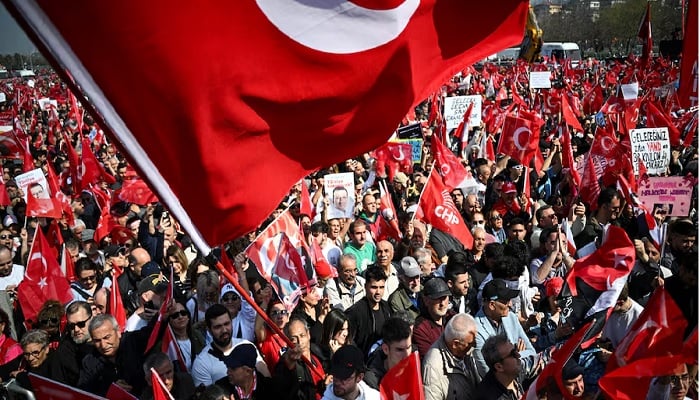Tens of thousands of people gathered in Istanbul on Saturday to protest the imprisonment of Mayor Ekrem Imamoglu, a leading rival of President Tayyip Erdogan, marking the largest demonstrations Turkey has witnessed in over a decade.
Following Imamoglu’s detention last week and subsequent jailing pending trial on graft charges, hundreds of thousands across the nation have responded to opposition calls by taking to the streets. While protests have remained largely peaceful, nearly 2,000 individuals have been detained.
The main opposition Republican People’s Party (CHP), along with other opposition parties, human rights organizations, and Western nations, have denounced the case against Imamoglu as a politically motivated attempt to eliminate a potential electoral challenger to Erdogan.
The government denies any interference in the judiciary, asserting the courts’ independence.
Tens of thousands of people, waving Turkish flags and banners, converged on the Maltepe seafront rally grounds on Istanbul’s Asian side for the “Freedom for Imamoglu” rally, organized by the CHP.
“If justice is silent, the people will speak,” read one banner held high in the crowd.
“The economy, justice, the rule of law—everything is deteriorating. That’s why we are here. We demand ‘rights, law, and justice,'” said a CHP supporter who declined to be named.
Last Sunday, the CHP held a primary election to endorse Imamoglu as their candidate for the next presidential election, scheduled for 2028. However, the CHP is advocating for an early election, claiming the government has lost its legitimacy.
Interior Minister Ali Yerlikaya reported this week that nearly 1,900 people have been detained since the protests began, with courts jailing 260 of them pending trial as of Thursday.
Erdogan, who has dominated Turkish politics for over two decades, has dismissed the nationwide protests as a “show,” warned of legal repercussions, and urged the CHP to cease “provoking” Turkish citizens.
Imamoglu’s detention has triggered a plunge in Turkish financial assets, leading the central bank to utilize reserves to support the lira. The resulting turmoil has sent shockwaves through the private sector.
The government has downplayed the impact as limited and temporary. The central bank maintains that the economy’s core dynamics remain unaffected but has indicated it will take further measures if necessary.



